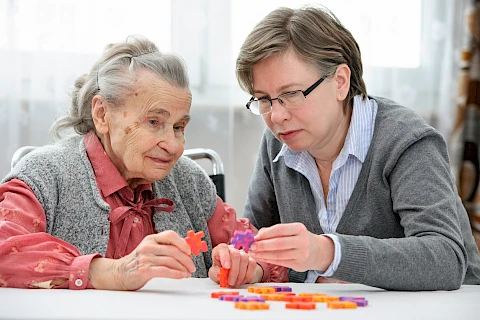
Cognitive health is crucial to our overall well-being and quality of life. This is particularly true for our senior loved ones, and as caretakers, we are uniquely positioned to help promote and enhance their cognitive health. We need to understand the significance of cognitive health, know how to foster it, and be equipped with the right tools and resources.
This blog explores the critical role caretakers play in promoting cognitive health in seniors, highlighting the importance of mentally stimulating activities. We'll also provide practical guidance on incorporating brain exercises into everyday routines. Whether you're a professional care provider or a family member providing care, this post is designed to equip you with valuable insights and strategies beneficial to your senior loved ones.
What Is Cognitive Health?
Cognitive health is the ability to think clearly, remember, and learn new things. It involves various brain functions such as judgment, language, memory, and spatial skills. Preserving cognitive health is vital in seniors, as it can influence their independence, personal relationships, and engagement with the world.
How Caretakers Can Promote Cognitive Health
As caretakers, we have a unique role in maintaining and improving the cognitive health of the seniors in our care. Whether it's helping with daily tasks or initiating mentally stimulating activities, each effort counts. Our care goes beyond ensuring physical health; it nurtures cognitive well-being and helps seniors stay mentally active, challenged, and engaged.
Benefits of Mentally Stimulating Activities
Regular engagement in mentally stimulating activities provides significant cognitive benefits. Activities such as puzzles, reading, and learning new skills keep the brain active and reduce the risk of cognitive decline. These activities aren't simply time-fillers; they're tools for awakening and exercising the mind, enhancing memory and thinking skills.
Let's consider reading, for instance. A study published in the Neurology journal found that engaging in cognitive activities like reading can slow down age-related cognitive decline. Similarly, puzzles serve as excellent brain workouts. They challenge and stimulate multiple brain parts, improving memory and problem-solving skills. Learning a new skill, like a foreign language or a musical instrument, also works wonders for the brain. It promotes mental agility, enhances memory, and boosts self-esteem and self-efficacy.
Incorporating Brain Exercises into Daily Care Routines
Make cognitive stimulation a regular part of care routines. The key is finding activities our seniors enjoy regularly and can engage in. For instance, if your loved one enjoys reading, ensure they can access various books. Read together and discuss the storylines and characters, creating a shared learning experience.
Another idea is to incorporate puzzles into downtime. Whether it's a jigsaw puzzle, crosswords, or Sudoku, these activities can be a fun yet challenging addition to the day. Encourage seniors to learn new skills, be it knitting, painting, or even using a tablet for Internet research.
Looking for More Cognitive Care Activities?
Caretakers are pivotal in promoting cognitive health in seniors. Beyond ensuring their physical well-being, we have the opportunity to enhance their mental agility, memory, and overall cognitive health. Engaging seniors in brain-stimulating activities is immensely beneficial, and incorporating these into daily routines is necessary.
If you reside in Racine, Kenosha, Union Grove, or Pleasant Prairie, and you're seeking support in caring for your senior loved ones, don't hesitate to contact us at Senior Helpers Racine. We are committed to providing exceptional care, promoting cognitive health, and enriching the lives of seniors in our community.